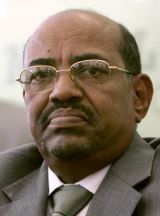US says Sudan’s Bashir is “misguided”
March 20, 2007 (WASHINGTON) — The United States on Tuesday called Sudan’s President Omar Hassan al-Bashir “misguided” after he denied his government was involved in human rights abuses in Darfur.
 “It just bears no resemblance to reality,” said State Department spokesman Sean McCormack when asked to comment on an interview Bashir gave to a U.S. television network.
“It just bears no resemblance to reality,” said State Department spokesman Sean McCormack when asked to comment on an interview Bashir gave to a U.S. television network.
In the NBC interview aired on Monday, Bashir was shown a picture of a U.S. State Department map depicting burned villages in Sudan’s vast western region. He called the picture a “fabrication” and also denied rape was a problem in Darfur.
“People have been killed because there is war. It is not in the Sudanese culture or people of Darfur to rape. It doesn’t exist. We don’t have it,” Bashir said.
Bashir likened the photograph to pictures shown by former U.S. Secretary of State Colin Powell at the U.N. Security Council before the start of the Iraq war as proof of the presence of weapons of mass destruction in Iraq. No such weapons have been found since the war started four years ago.
Experts say more than 200,000 people have been killed since rebels in Darfur rose up against the government in 2003, accusing Khartoum of discrimination against non-Arab farmers there. More than 2.5 million people have been forced from their homes and aid groups say mass rapes have occurred.
McCormack said U.S. Secretary of State Condoleezza Rice had visited a camp for displaced people in Darfur and heard the stories of rape and brutality herself.
“She (Rice) sat down across from women who recounted awful stories of being brutalized as the result of just going out to collect firewood, trying to — just trying to help maintain the basic necessities of life, cook food for their children,” said McCormack.
“So it’s very real. We’ve seen it. We have heard firsthand accounts of it. And to try to brush this aside as mere fabrications of the United States or others is really just misguided,” he added.
The United States is considering new sanctions against Sudan for its handling of Darfur and Bashir’s refusal to agree to a joint U.N./African Union peacekeeping force for Darfur.
“The world is not going to stand by and watch the continued humanitarian suffering … because the Sudanese government has refused to cooperate with the deployment of A.U./U.N. expanded forces,” said McCormack.
“We have gotten to a point where we need to look, give a good, hard look at what levers we might use at our disposal in order to convince the Sudanese government to change its position.”
New sanctions under consideration include restrictions on companies that do business in Sudan in U.S. dollars as well as travel bans on two politicians accused of “atrocious acts” and a rebel leader who was “obstructionist” in peace talks, U.S. envoy Andrew Natsios said last week.
(Reuters)
